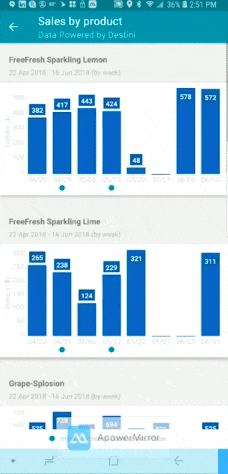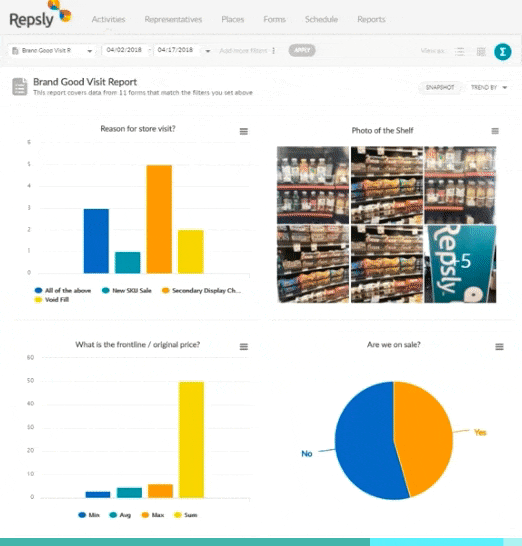In a world that places increasing importance on constant innovation, brands must work harder than ever to keep their products relevant to retailers and consumers.That requires a lot of legwork, which can be overwhelming, especially for growing teams trying to manage their operations on outdated or redundant systems.
It’s impossible for business owners to be everywhere at once. By using modern, mobile-optimized CRM software to manage your sales, supply chain, and marketing efforts, you can ensure that your time is being spent in the right places and that your team is working efficiently to succeed in their roles. Let’s start by taking a look at how traditional CRM systems have evolved to the formats we can use today.
Unpacking CRM
It’s sometimes hard to define what a customer relationship management (CRM) system is in simple terms. A CRM provides a way to manage a company’s interactions with its current accounts and also provides ways to drive sales growth by converting today’s leads into tomorrow’s paying customers. Brands use CRMs to streamline and optimize all aspects of their sales funnels.
The Shift Toward Mobile
CRM software is vital for brands of all sizes, whether they’re looking to expand their territories or are already supplying national retailers. This broad potential geographic range often requires deploying of field teams, and most field employees are already using mobile technology to manage their work remotely, an approach that offers considerable payoffs. Brands with mobile-accessible CRM platforms have reported that 65 percent of reps hit their sales quotas, while only 22 percent of teams without mobile-accessible CRMs reached the same targets.
This movement toward mobile accessibility opens the door for brands to substantially increase their sales team members’ agility and sales fluency. How is this made possible? Let’s explore the four biggest ways in which mobile CRM is changing businesses’ supply and sales strategies
1. Better Ways to Identify And Act on Opportunities
One of connected software’s most powerful features is the sheer volume of data it puts at your fingertips. And yet this functionality is often underutilized. Certain mobile CRMs can give your team insight into how well your products perform across your portfolio of retailers, often to very granular levels, such as on store-by-store basis. CRM software can also offer insights about your products that your retail partners don’t have, which can include strategies for grouping products together in displays in order to increase sell-through rates.

One benefit of Mobile CRM is having product sales data available at the click of a button.
Retailers sometimes balk at the idea of sharing proprietary sales data, which makes it all the more worth the effort for your team to use its CRM to identify lucrative opportunities. Walter Loeb, former senior retail analyst for Morgan Stanley, says, “I wholeheartedly want buyers once again to be encouraged to step up and out sometimes and let them use the power of technology and data analysis to help them hone in on the best ideas quickly.” The data is out there, so make the most of it.
2. Create Clean And Consistent Reports
It’s understandably difficult to make data-driven decisions when the data is impossible to decipher. Simplifying the CRM user interface into digestible, highly organized graphics and real-time reporting tools is one of the best ways to ensure that your team not only has access to the data that matters, but that they also know how to interpret it and make their own inferences.

Reports populated with real-time data keep your brand ahead of the curve.
Additionally, modern CRM systems can integrate with many other types of software and platforms. This can allow you to work with data from your spreadsheets or accounting applications, or your customer loyalty and feedback management services, all in one place. This ultimately minimizes the number of services to manage and logins to remember for salespeople on the go, cutting down on hours of potentially redundant administrative work.
3. Keep Your Data Secure
Data breaches are a major source of worry for modern businesses. You’ve likely collected a substantial amount of private information about your team, your products, and your consumers. It’s important to understand how your CRM provider prioritizes data security in an era where many systems now operate from cloud-based platforms.
Most companies that offer these types of services do so with strict information security guidelines, to ensure the potential for a breach is minimal. Oracle CEO Mark Hurd has said that “The likelihood you’re more secure [with an on-premises system] than if you used an enterprise cloud provider is zero.”
Similarly, Google Cloud CEO Diane Greene has spoken out on the cloud stating, “it’s a more secure place to be.” Greene has further emphasized the benefits of the cloud by noting that it’s all about supercharging information to make companies more successful.
Cloud service providers dedicate themselves to securing their systems and your data and rolling out regular updates at scales and speeds a retail company’s IT staff simply can’t hope to match.
4. Increase And Improve Communication
Efficiency is the common thread interwoven through the myriad benefits of CRM systems. Engaging in real-time dialogue with key stakeholders in your salesforce is one key way to boost your organization’s efficiency.
Some CRMs come with their own built-in chat apps and customer-service management functions. The availability of real-time scheduling also keeps remote workers accountable and gives the home base more insight into how their teams spend their time, which can result in analytical insights that lead to improved workflows and significant time savings for you and your employees.
.gif?width=600&name=activities%20form%20GIF%20(1).gif)
Help reps in the field work more efficiently with scheduling optimization.
This kind of workflow oversight and analysis can only serve to help you manage your business more effectively as it scales. You can identify tasks on which excess time is spent and can also use your data to identify, incentivize, and retain top performers.
What’s Next?
CRM systems are always evolving, which is true of any software system. Current trends point to an increasing focus on user experience, mobile apps, and cloud technology.
No matter what service provider they use, your field team should only improve on their work if given more access to sales, marketing, and customer data. The right CRM will arm your company with the tools it needs to grow your sales and elevate your brand in the retail environment.




.gif?width=600&name=activities%20form%20GIF%20(1).gif)


